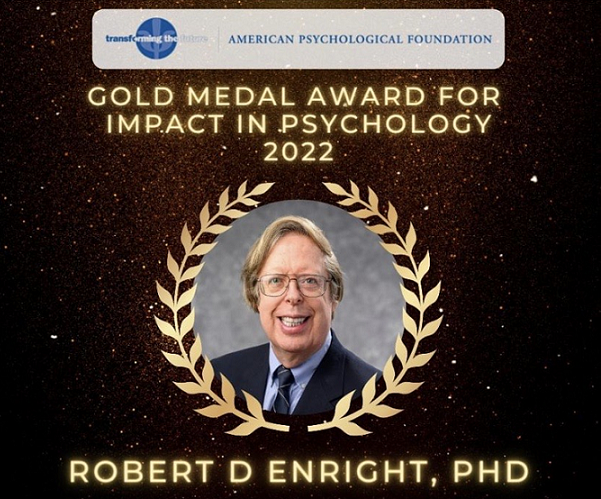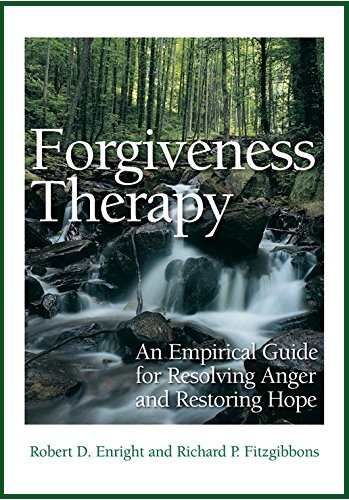Tagged: “forgiveness therapy”
IFI Earns “Top Website 2022” Award
The International Forgiveness Institute’s website, a global resource for Forgiveness Education and Forgiveness Therapy information, has been named one of the Internet’s best websites of 2022 by TheGoodEstate.
The TGE-AWARD ???? – The Best Websites of 2022
Officially called “The TGE-Award,” the annual recognition is based on a point system that evaluates four unique site elements:
- User Experience (UX) / Usability;
- Privacy & Security;
- Information Content & Research; and,
- Services & Communication.
The IFI earned a remarkable 39 out of a possible 40 points in the multi-stage selection, survey, and rating procedure that was conducted by a team of US web experts. Only premier websites selected for the award can display the “Top Website 2022” quality emblem. Newspapers, trade magazines, portals, and foreign websites are not eligible for the award.
 The IFI website is one of the most expansive forgiveness resources that exists anywhere in the world. Originally developed and moved online in 2011, the IFI website’s current iteration was built and customized two years ago by Meegaan Technologies, a website and mobile app design and development company in New Delhi, India. In addition to a robust index of 67 unique subject pages, the website features more than 2,273 separate blog posts.
The IFI website is one of the most expansive forgiveness resources that exists anywhere in the world. Originally developed and moved online in 2011, the IFI website’s current iteration was built and customized two years ago by Meegaan Technologies, a website and mobile app design and development company in New Delhi, India. In addition to a robust index of 67 unique subject pages, the website features more than 2,273 separate blog posts.
For details about The Best Websites of 2022 Award selection process and evaluation criteria, visit TheGoodEstate website—a multi-thematic review website where users can find high quality information about all kinds of digital and physical products. TheGoodEstate is a project of Global Commerce Media.
Agape Love and Forgiveness Conference Speaker Videos Available in Four Languages
Speaker videos from the International Educational Conference on Agape Love and Forgiveness, held July 19-20, 2022, in Madison, Wisconsin, USA, (funded by the John Templeton Foundation) can now be viewed online absolutely free in four languages–Arabic, English, Hebrew, and Mandarin–using the links below.
The 26 professionally produced presentations feature educators from Northern Ireland, Israel (both Hebrew- and Arabic-speaking), Taiwan, the Philippines, and the US. They describe their experiences teaching agape love and forgiveness to their 5th grade students and outline creative Forgiveness Education teaching techniques.

It seems to me that a safer approach when treated unfairly is to engage in Cognitive Behavioral Therapy and not forgiveness. Forgiveness invites an unwanted guest back into the heart. Cognitive Behavioral Therapy, in contrast, helps me to think in new ways so that I do not condemn myself for letting the injustice happen and it helps me keep my distance from the one who hurt me.
Research does show that Cognitive Behavioral Therapy as a psychotherapeutic technique can be helpful in changing one’s attitude toward difficult situations, but it may not be as effective as Forgiveness Therapy in getting rid of the elephant in the room which is deep, excessive anger that just won’t quit. Forgiveness Therapy has been shown to be very effective against the effects of trauma suffered because of others’ injustice. Forgiveness Therapy can take time and is a struggle because you are growing in the important virtue of having mercy on those who did not have mercy on you. Yet, the effort is worth it because the toxic anger can be reduced and eliminated. Some residual anger can remain, but it does not control the one who forgives.
Forgiveness Research Goes Viral
Surging world-wide interest in the virtue of forgiveness was vividly demonstrated this week when the International Forgiveness Institute (IFI) released updated distribution totals for its prized Forgiveness Research Tools.
In just the past 17 months, the IFI has fulfilled requests for 717 copies of its Forgiveness Research Tools–requests received from individuals and research organizations in 41 countries and 43 US states plus the District of Columbia. The IFI began offering the tools for free on April 1, 2021.
The forgiveness tools were developed by IFI co-founder![]() Dr. Robert Enright and his associates through the Enright Forgiveness Lab that he established at the University of Wisconsin-Madison. Dr. Enright has validated those scientific measuring tools and used them in more than 50 forgiveness research projects he has conducted at locations around the world since 1993.
Dr. Robert Enright and his associates through the Enright Forgiveness Lab that he established at the University of Wisconsin-Madison. Dr. Enright has validated those scientific measuring tools and used them in more than 50 forgiveness research projects he has conducted at locations around the world since 1993.
By far the most popular and most requested forgiveness tool (223 requests) is the Enright
Self-Forgiveness Inventory (ESFI) that “captures the Aristotelian view of forgiveness as a moral virtue practiced toward the self.” According to Dr. Enright, the tool is based on the premise that “self-forgiveness is a moral virtue, not a psychological technique.”
Close behind in requests (201) is the Enright Forgiveness Inventory-30 (EFI-30)—a shortened version of the Enright Forgiveness Inventory for Adults that has become the interpersonal forgiveness measure tool of choice for research professionals since its development in 1995.
Two other forgiveness tools developed by Dr. Enright are also extremely popular:
- The Enright Forgiveness Inventory for Children—an objective measure of the degree to which one person forgives another who has hurt him or her deeply and unfairly (125 requests); and,
- The Enright Group Forgiveness Inventory—a newly-developed research tool that takes forgiveness from its traditional focus on individuals to a higher magnitude by concentrating on group forgiveness—an area of intervention that has dramatic implications for its ability to enhance peace efforts in the world (109 requests).
Dr. Enright is a licensed psychologist and an educational psychology professor at UW-Madison who pioneered the scientific study of forgiveness. He wrote the first scientific journal article on person-to-person forgiveness, is often introduced as “the father of forgiveness research,” and has been labeled “the forgiveness trailblazer” by Time magazine.
 In 2019, Dr. Enright received the international Expanded Reason Award from the Universidad Francisco de Vitoria and the Vatican Foundation Joseph Ratzinger/Benedict XVI and he holds the Aristotelian Professorship in Forgiveness Science (2020) from UW-Madison. Earlier this year he was awarded the 2022 American Psychological Foundation Gold Medal Award for Impact in Psychology. His work integrates psychology, philosophy, and psychotherapeutic disciplines.
In 2019, Dr. Enright received the international Expanded Reason Award from the Universidad Francisco de Vitoria and the Vatican Foundation Joseph Ratzinger/Benedict XVI and he holds the Aristotelian Professorship in Forgiveness Science (2020) from UW-Madison. Earlier this year he was awarded the 2022 American Psychological Foundation Gold Medal Award for Impact in Psychology. His work integrates psychology, philosophy, and psychotherapeutic disciplines.
Dr. Enright’s 37-year quest to harness what he calls “the power of forgiveness” has resulted in the development of curriculum guides for students at each level from pre-kindergarten through 12th grade that are now being used in more than 30 countries around the world.
His groundbreaking clinical manual Forgiveness Therapy, developed with psychiatrist Dr. Richard Fitzgibbons through the American Psychological Association, is the basis for the world’s first online forgiveness education course for psychologists, social workers, nurses, and other professional counselors. It is offered exclusively through the IFI.
developed with psychiatrist Dr. Richard Fitzgibbons through the American Psychological Association, is the basis for the world’s first online forgiveness education course for psychologists, social workers, nurses, and other professional counselors. It is offered exclusively through the IFI.
“When I first began exploring the virtue of forgiveness, I was unable to find a single scientific journal article on forgiveness that had been published anywhere in the world,” Dr. Enright recalls. “Today there are literally hundreds of such articles and based on the demand for our research tools, that number will soon be growing exponentially.”
Dr. Enright’s forgiveness research tools are available free upon request at the International Forgiveness Institute website: internationalforgiveness.com or via email: director@internationalforgiveness.com.
I have tried cognitive and cognitive-behavioral therapies and they do not work in a deep way for me. In other words, I can change my thinking about the situation, try not to see it as a catastrophe, but still I have unsettled emotions inside that need healing. Can forgiveness aid the recovery of more positive emotions and, if so, how does this occur?
Yes, you could include forgiveness in your therapeutic work. In contrast to the therapies in which you have engaged, forgiveness goes beyond the examination of your symptoms in the context of the injustice(s) against you. Forgiveness therapy goes to the root cause of the continued emotional upset by having you do the work of focusing on the one who hurt you, trying to see this person as someone who possesses inherent worth. As you see the other’s worth, this can enhance a sense of empathy and compassion toward the other and this has the paradoxical effect of lowering the temperature of your anger. So, adding forgiveness to your program likely will be beneficial for you. I wish you the very best in your healing journey.







